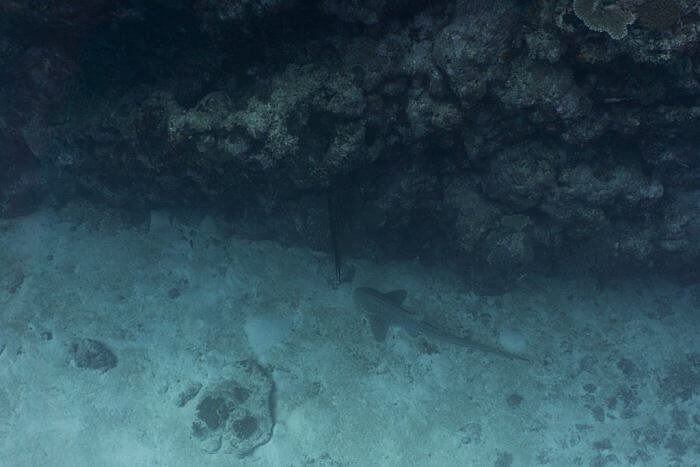
Photo courtesy of Valerie Taylor and BLUE The Film where she recounted her conversation with Neil Armstrong.
In a conversation with Neil Armstrong, Valerie Taylor, an ocean conservationist and scuba diver, told him something along the lines of, “Why venture out into space when we don’t even understand the ocean as our own backyard?”
The studies of astronomy and oceanography tend to attract similar types of personalities. These personality types tend to be equal parts dreamers, explorers, and logicians who grasp at the unknown and whittle away at the abstract until it becomes understandable.
A few of these personalities live to become professional astronauts and oceanographers, while the rest quell their curiosity with the aid of telescopes and scuba gear.
If you’re drawn to new places (hello, travel), then scuba diving is one of the most accessible ways to satisfy your desire to see the unknown. Once you fall in love with diving, you’ll never travel in the same way again.
Boring places become fascinating
When you become a diver, destinations with boring reputations suddenly become fascinating. You can view your travels through the two lenses of land and sea based exploration. Any nearby body of water is fair game for venturing into — so long as you can access scuba gear. Interestingly, some of the most unassuming regions often have the best scuba diving. Climates that are too hot and arid to cater to land life can provide the perfect conditions for coral reefs, which are home to one of the most biologically diverse ecosystems.

Zebra shark resting on the sand
There are quarry dive sites throughout the middle of the U.S. filled with sunken retro cars, abandoned mining equipment, homes, and other oddities. Dahab, Egypt, a small town with a barren landscape, is teeming with marine life in the bordering Red Sea. The northwest coastline of Australia sounds lackluster when you describe it as a land covered in red sand with the occasional kangaroo hopping across your path — yet it is one of the few places in the world where you can swim alongside whale sharks and humpback whales.

You’ll feel completely free
 Like being in outer space, scuba diving forces you to adapt to an environment that the human body wasn’t built for. Divers use air tanks as aquatic lungs, computers to tell them how long they can stay underwater without getting sick, and must constantly breathe to manage the pressure on their lungs. Despite all the rules and equipment, scuba diving is freeing. Once you descend beyond the surface into the blue, your body becomes weightless. All thoughts, sources of stress, and insecurities are left on land.
Like being in outer space, scuba diving forces you to adapt to an environment that the human body wasn’t built for. Divers use air tanks as aquatic lungs, computers to tell them how long they can stay underwater without getting sick, and must constantly breathe to manage the pressure on their lungs. Despite all the rules and equipment, scuba diving is freeing. Once you descend beyond the surface into the blue, your body becomes weightless. All thoughts, sources of stress, and insecurities are left on land.
While you do need to be cleared by a doctor to dive, it’s a myth that scuba diving is solely for fit people or requires a lot of skill. People of all abilities and backgrounds are drawn to diving. There are divers who are paraplegic, suffer from PTSD, have issues with their joints, and other ailments. Being immersed by nothing but water mutes many senses, relieves any tension (due to being neutrally buoyant), and the sound of your breath fosters a form of meditation. While being nervous about diving at the beginning is understandable, most divers who eventually take the plunge admit that it was much more relaxing than they thought it would be.
You’ll find friends everywhere
As a general rule, scuba divers prefer to dive with a buddy. Diving with a trusted friend is not only safer than diving solo, it’s infinitely more enjoyable. While describing how you saw a turtle swim just a few feet away from you or watched a shark chase after a school of fish makes for an interesting story, only those who were with you can truly understand just how wonderful it was. Like many niche hobbies, scuba diving is a a great conversation starter among divers. There are plenty of meet-up groups, liveaboards, clubs, and events where you can meet other divers as a solo traveler. As long as there is water nearby, you are sure to find a friend.

Every experience is different
You can stay in the same hotel room twice, eat the same meal twice, have the same conversation twice, but you can never have the same dive twice… unless you are at a surprisingly crappy dive site (in this case, why are you bothering to go again?). The conditions underwater are constantly changing and vary greatly depending on the tide, the weather, and the time of day. One of the greatest aspects of travel is the novelty of being in new destinations. Scuba diving ensures that you see something new every time you travel, even if you’ve already been to that place before.

